Governance and Ethics: Takata Airbags Case Study Analysis
VerifiedAdded on 2023/01/11
|10
|2575
|76
Case Study
AI Summary
This case study examines the Takata Corporation's unethical practices concerning defective airbags, which led to numerous injuries and deaths, resulting in a massive recall and bankruptcy. The report analyzes the company's negligence in adhering to safety standards, its failure to adopt new technologies, and its lack of ethical responsibility towards customer safety. The case study discusses the impact of these failures on the company's brand image, financial performance, and the importance of ethical decision-making. It also explores various ethical approaches, such as utilitarian, rights, fairness, common goal, and virtue approaches, that Takata could have used to avoid the crisis. The analysis emphasizes the importance of ethical governance, customer safety, and the integration of technology in business operations. The report concludes that Takata's unethical behavior had a detrimental impact on its stakeholders and highlights the importance of ethical conduct for long-term business success and customer satisfaction.
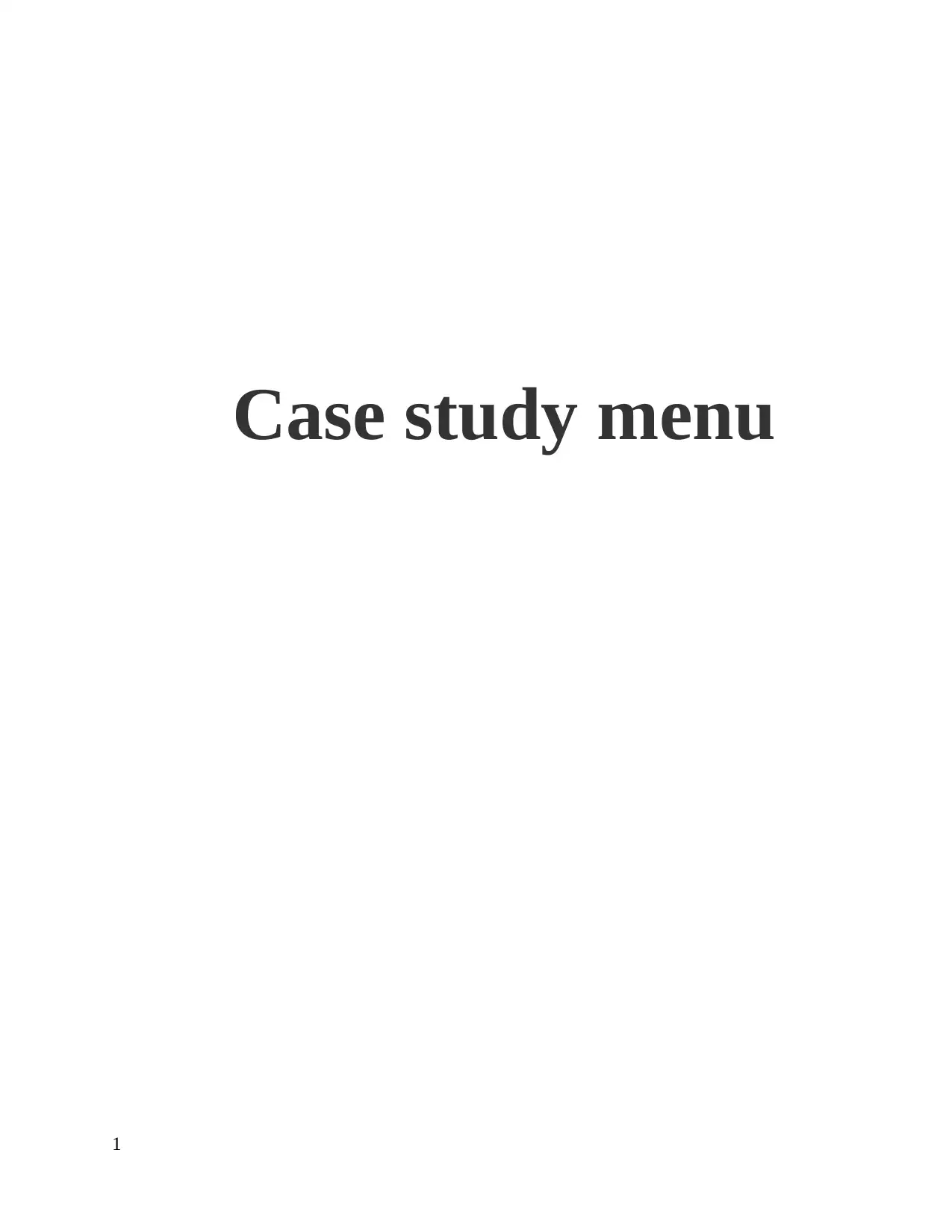
Case study menu
1
1
Paraphrase This Document
Need a fresh take? Get an instant paraphrase of this document with our AI Paraphraser
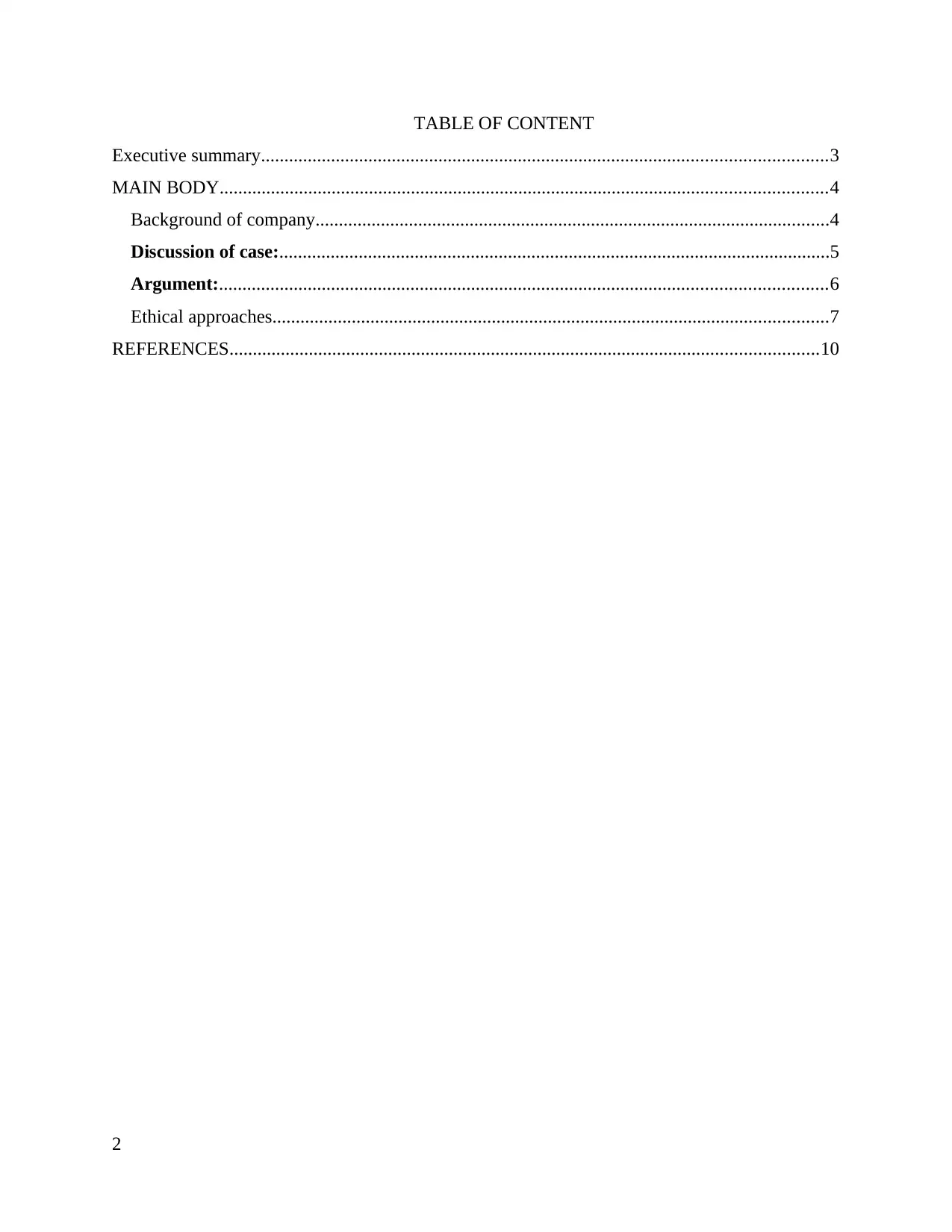
TABLE OF CONTENT
Executive summary.........................................................................................................................3
MAIN BODY..................................................................................................................................4
Background of company..............................................................................................................4
Discussion of case:......................................................................................................................5
Argument:..................................................................................................................................6
Ethical approaches.......................................................................................................................7
REFERENCES..............................................................................................................................10
2
Executive summary.........................................................................................................................3
MAIN BODY..................................................................................................................................4
Background of company..............................................................................................................4
Discussion of case:......................................................................................................................5
Argument:..................................................................................................................................6
Ethical approaches.......................................................................................................................7
REFERENCES..............................................................................................................................10
2
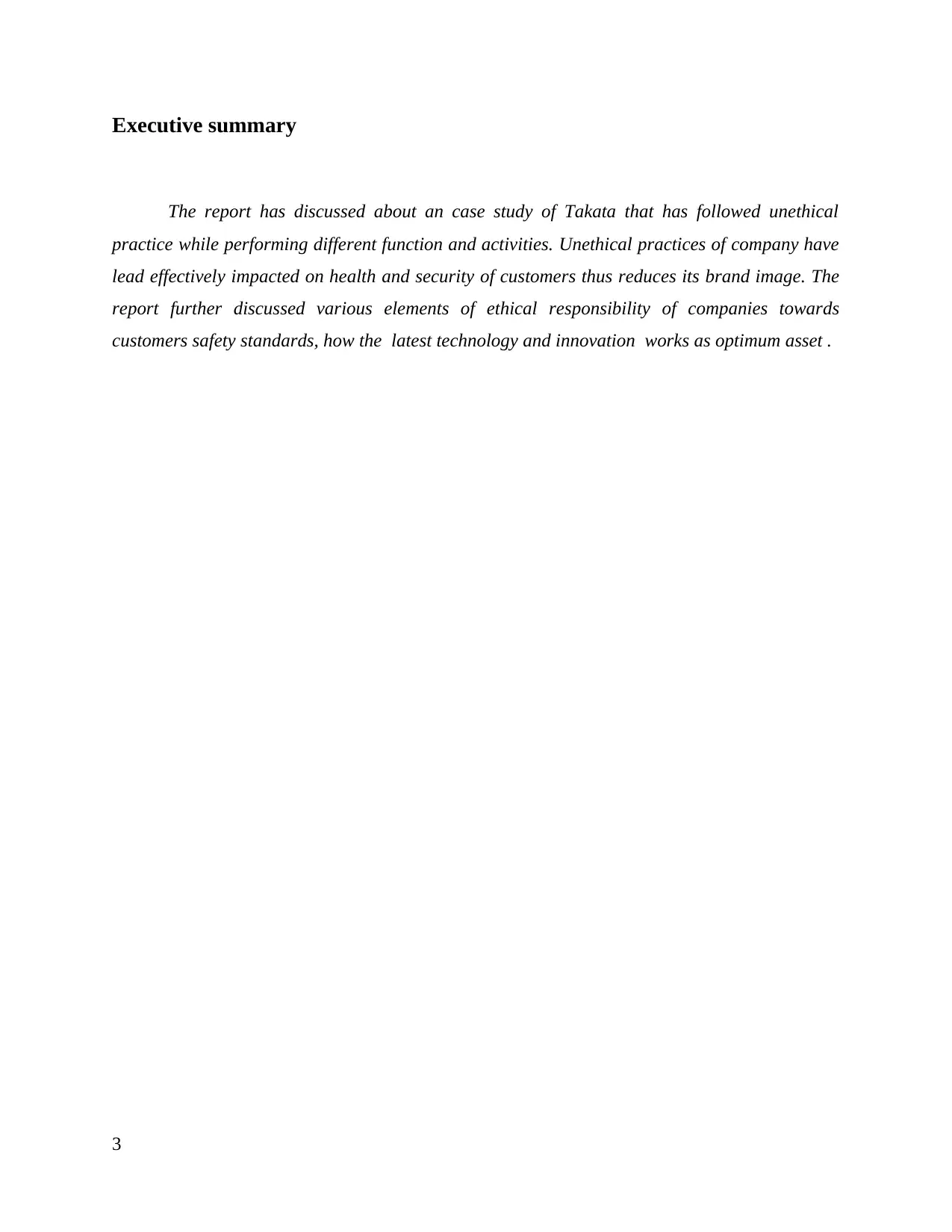
Executive summary
The report has discussed about an case study of Takata that has followed unethical
practice while performing different function and activities. Unethical practices of company have
lead effectively impacted on health and security of customers thus reduces its brand image. The
report further discussed various elements of ethical responsibility of companies towards
customers safety standards, how the latest technology and innovation works as optimum asset .
3
The report has discussed about an case study of Takata that has followed unethical
practice while performing different function and activities. Unethical practices of company have
lead effectively impacted on health and security of customers thus reduces its brand image. The
report further discussed various elements of ethical responsibility of companies towards
customers safety standards, how the latest technology and innovation works as optimum asset .
3
⊘ This is a preview!⊘
Do you want full access?
Subscribe today to unlock all pages.

Trusted by 1+ million students worldwide
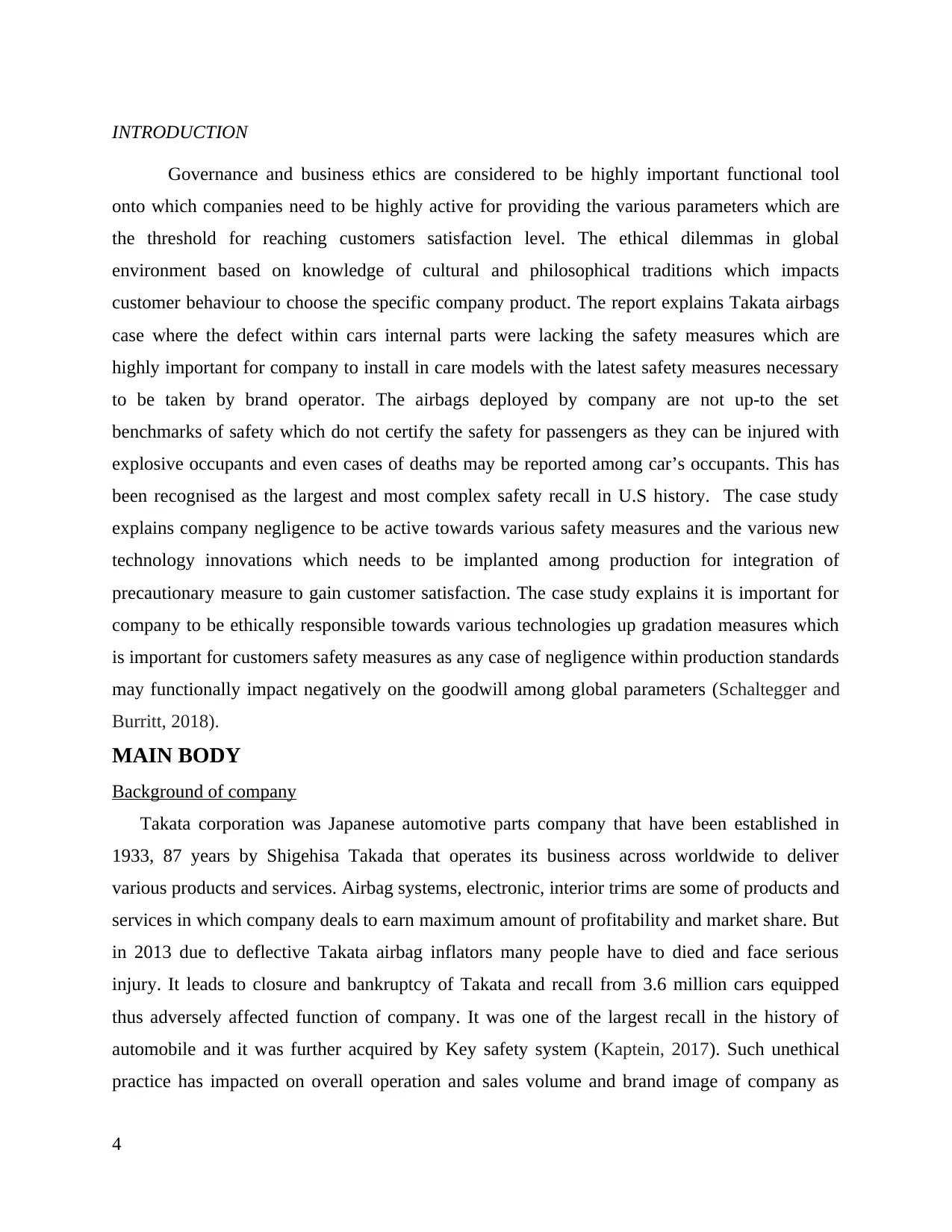
INTRODUCTION
Governance and business ethics are considered to be highly important functional tool
onto which companies need to be highly active for providing the various parameters which are
the threshold for reaching customers satisfaction level. The ethical dilemmas in global
environment based on knowledge of cultural and philosophical traditions which impacts
customer behaviour to choose the specific company product. The report explains Takata airbags
case where the defect within cars internal parts were lacking the safety measures which are
highly important for company to install in care models with the latest safety measures necessary
to be taken by brand operator. The airbags deployed by company are not up-to the set
benchmarks of safety which do not certify the safety for passengers as they can be injured with
explosive occupants and even cases of deaths may be reported among car’s occupants. This has
been recognised as the largest and most complex safety recall in U.S history. The case study
explains company negligence to be active towards various safety measures and the various new
technology innovations which needs to be implanted among production for integration of
precautionary measure to gain customer satisfaction. The case study explains it is important for
company to be ethically responsible towards various technologies up gradation measures which
is important for customers safety measures as any case of negligence within production standards
may functionally impact negatively on the goodwill among global parameters (Schaltegger and
Burritt, 2018).
MAIN BODY
Background of company
Takata corporation was Japanese automotive parts company that have been established in
1933, 87 years by Shigehisa Takada that operates its business across worldwide to deliver
various products and services. Airbag systems, electronic, interior trims are some of products and
services in which company deals to earn maximum amount of profitability and market share. But
in 2013 due to deflective Takata airbag inflators many people have to died and face serious
injury. It leads to closure and bankruptcy of Takata and recall from 3.6 million cars equipped
thus adversely affected function of company. It was one of the largest recall in the history of
automobile and it was further acquired by Key safety system (Kaptein, 2017). Such unethical
practice has impacted on overall operation and sales volume and brand image of company as
4
Governance and business ethics are considered to be highly important functional tool
onto which companies need to be highly active for providing the various parameters which are
the threshold for reaching customers satisfaction level. The ethical dilemmas in global
environment based on knowledge of cultural and philosophical traditions which impacts
customer behaviour to choose the specific company product. The report explains Takata airbags
case where the defect within cars internal parts were lacking the safety measures which are
highly important for company to install in care models with the latest safety measures necessary
to be taken by brand operator. The airbags deployed by company are not up-to the set
benchmarks of safety which do not certify the safety for passengers as they can be injured with
explosive occupants and even cases of deaths may be reported among car’s occupants. This has
been recognised as the largest and most complex safety recall in U.S history. The case study
explains company negligence to be active towards various safety measures and the various new
technology innovations which needs to be implanted among production for integration of
precautionary measure to gain customer satisfaction. The case study explains it is important for
company to be ethically responsible towards various technologies up gradation measures which
is important for customers safety measures as any case of negligence within production standards
may functionally impact negatively on the goodwill among global parameters (Schaltegger and
Burritt, 2018).
MAIN BODY
Background of company
Takata corporation was Japanese automotive parts company that have been established in
1933, 87 years by Shigehisa Takada that operates its business across worldwide to deliver
various products and services. Airbag systems, electronic, interior trims are some of products and
services in which company deals to earn maximum amount of profitability and market share. But
in 2013 due to deflective Takata airbag inflators many people have to died and face serious
injury. It leads to closure and bankruptcy of Takata and recall from 3.6 million cars equipped
thus adversely affected function of company. It was one of the largest recall in the history of
automobile and it was further acquired by Key safety system (Kaptein, 2017). Such unethical
practice has impacted on overall operation and sales volume and brand image of company as
4
Paraphrase This Document
Need a fresh take? Get an instant paraphrase of this document with our AI Paraphraser
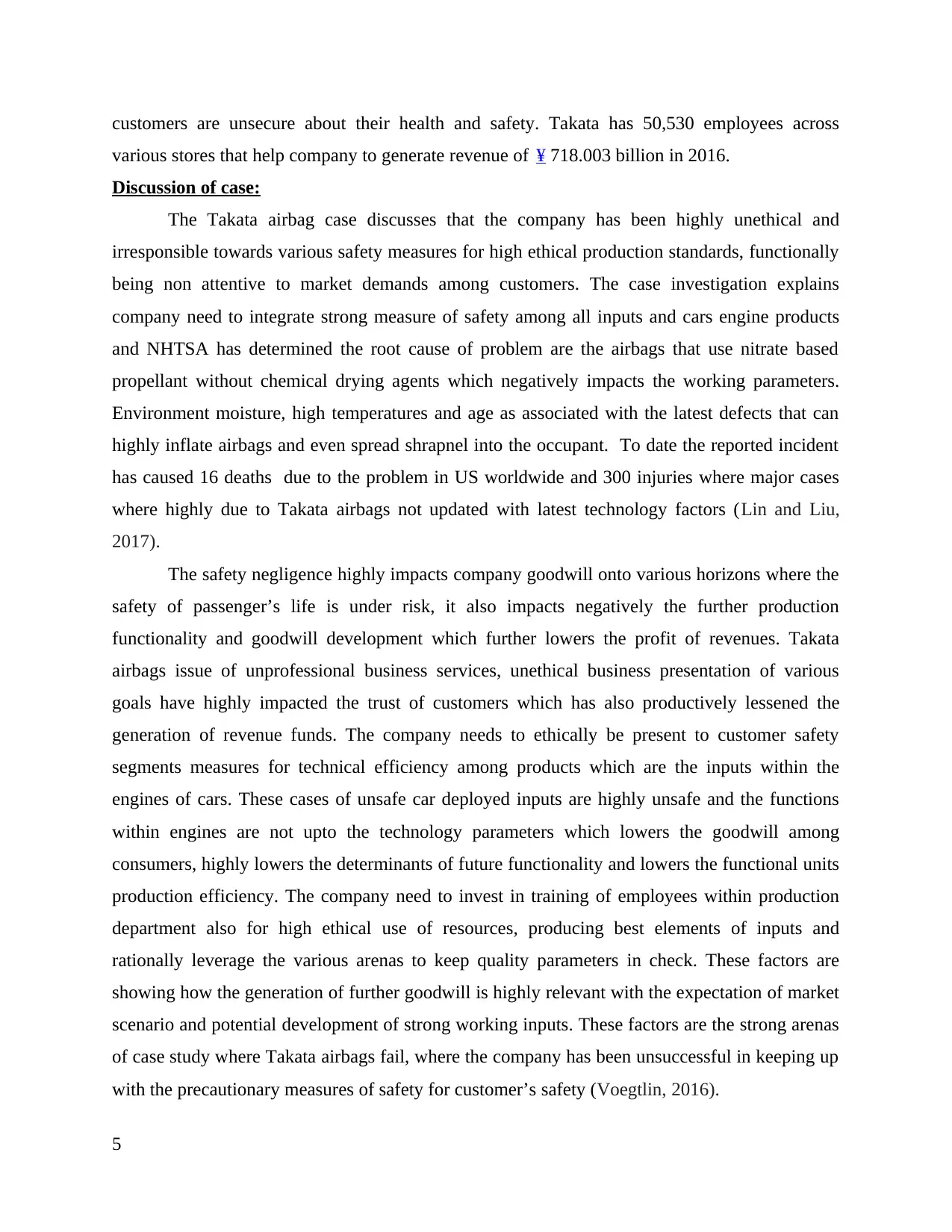
customers are unsecure about their health and safety. Takata has 50,530 employees across
various stores that help company to generate revenue of ¥ 718.003 billion in 2016.
Discussion of case:
The Takata airbag case discusses that the company has been highly unethical and
irresponsible towards various safety measures for high ethical production standards, functionally
being non attentive to market demands among customers. The case investigation explains
company need to integrate strong measure of safety among all inputs and cars engine products
and NHTSA has determined the root cause of problem are the airbags that use nitrate based
propellant without chemical drying agents which negatively impacts the working parameters.
Environment moisture, high temperatures and age as associated with the latest defects that can
highly inflate airbags and even spread shrapnel into the occupant. To date the reported incident
has caused 16 deaths due to the problem in US worldwide and 300 injuries where major cases
where highly due to Takata airbags not updated with latest technology factors (Lin and Liu,
2017).
The safety negligence highly impacts company goodwill onto various horizons where the
safety of passenger’s life is under risk, it also impacts negatively the further production
functionality and goodwill development which further lowers the profit of revenues. Takata
airbags issue of unprofessional business services, unethical business presentation of various
goals have highly impacted the trust of customers which has also productively lessened the
generation of revenue funds. The company needs to ethically be present to customer safety
segments measures for technical efficiency among products which are the inputs within the
engines of cars. These cases of unsafe car deployed inputs are highly unsafe and the functions
within engines are not upto the technology parameters which lowers the goodwill among
consumers, highly lowers the determinants of future functionality and lowers the functional units
production efficiency. The company need to invest in training of employees within production
department also for high ethical use of resources, producing best elements of inputs and
rationally leverage the various arenas to keep quality parameters in check. These factors are
showing how the generation of further goodwill is highly relevant with the expectation of market
scenario and potential development of strong working inputs. These factors are the strong arenas
of case study where Takata airbags fail, where the company has been unsuccessful in keeping up
with the precautionary measures of safety for customer’s safety (Voegtlin, 2016).
5
various stores that help company to generate revenue of ¥ 718.003 billion in 2016.
Discussion of case:
The Takata airbag case discusses that the company has been highly unethical and
irresponsible towards various safety measures for high ethical production standards, functionally
being non attentive to market demands among customers. The case investigation explains
company need to integrate strong measure of safety among all inputs and cars engine products
and NHTSA has determined the root cause of problem are the airbags that use nitrate based
propellant without chemical drying agents which negatively impacts the working parameters.
Environment moisture, high temperatures and age as associated with the latest defects that can
highly inflate airbags and even spread shrapnel into the occupant. To date the reported incident
has caused 16 deaths due to the problem in US worldwide and 300 injuries where major cases
where highly due to Takata airbags not updated with latest technology factors (Lin and Liu,
2017).
The safety negligence highly impacts company goodwill onto various horizons where the
safety of passenger’s life is under risk, it also impacts negatively the further production
functionality and goodwill development which further lowers the profit of revenues. Takata
airbags issue of unprofessional business services, unethical business presentation of various
goals have highly impacted the trust of customers which has also productively lessened the
generation of revenue funds. The company needs to ethically be present to customer safety
segments measures for technical efficiency among products which are the inputs within the
engines of cars. These cases of unsafe car deployed inputs are highly unsafe and the functions
within engines are not upto the technology parameters which lowers the goodwill among
consumers, highly lowers the determinants of future functionality and lowers the functional units
production efficiency. The company need to invest in training of employees within production
department also for high ethical use of resources, producing best elements of inputs and
rationally leverage the various arenas to keep quality parameters in check. These factors are
showing how the generation of further goodwill is highly relevant with the expectation of market
scenario and potential development of strong working inputs. These factors are the strong arenas
of case study where Takata airbags fail, where the company has been unsuccessful in keeping up
with the precautionary measures of safety for customer’s safety (Voegtlin, 2016).
5
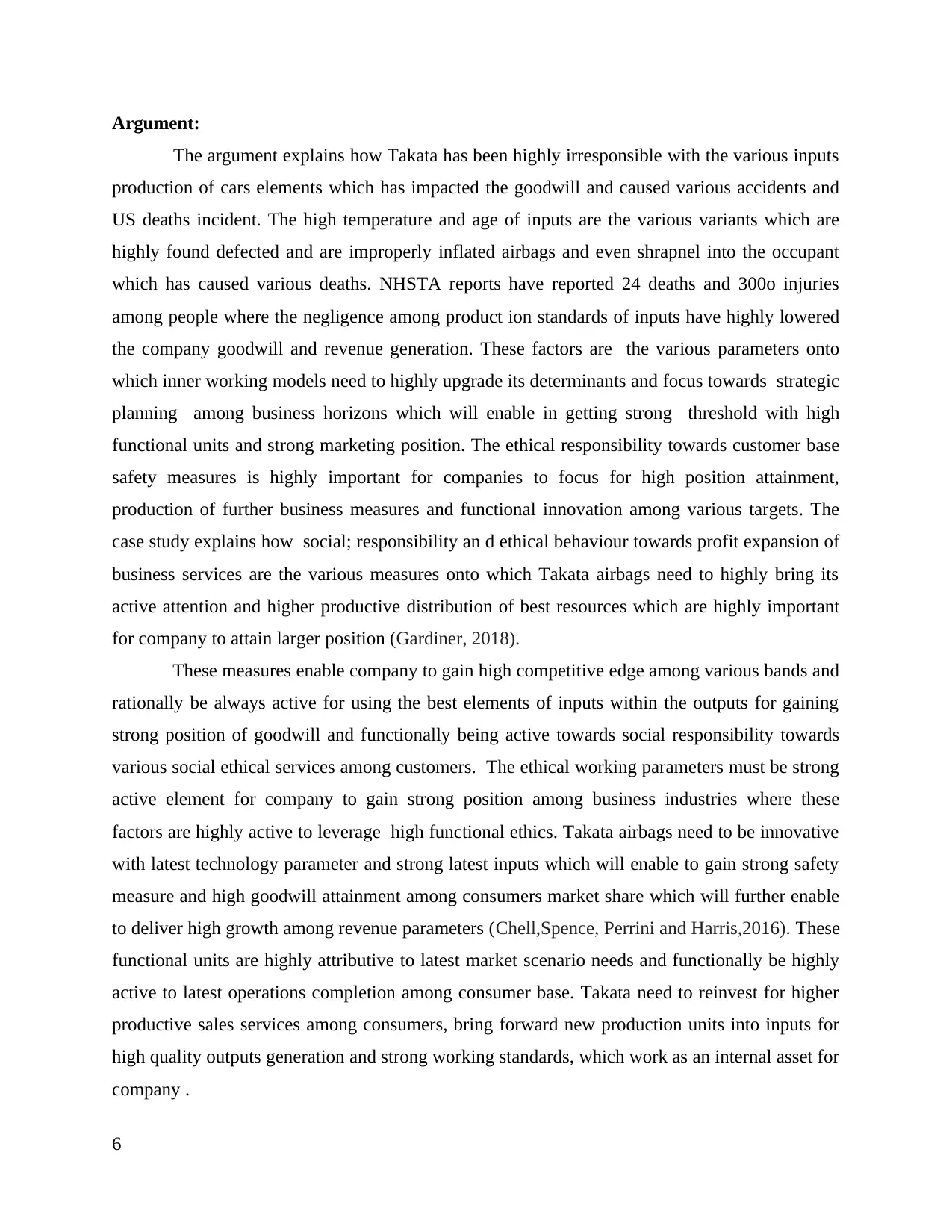
Argument:
The argument explains how Takata has been highly irresponsible with the various inputs
production of cars elements which has impacted the goodwill and caused various accidents and
US deaths incident. The high temperature and age of inputs are the various variants which are
highly found defected and are improperly inflated airbags and even shrapnel into the occupant
which has caused various deaths. NHSTA reports have reported 24 deaths and 300o injuries
among people where the negligence among product ion standards of inputs have highly lowered
the company goodwill and revenue generation. These factors are the various parameters onto
which inner working models need to highly upgrade its determinants and focus towards strategic
planning among business horizons which will enable in getting strong threshold with high
functional units and strong marketing position. The ethical responsibility towards customer base
safety measures is highly important for companies to focus for high position attainment,
production of further business measures and functional innovation among various targets. The
case study explains how social; responsibility an d ethical behaviour towards profit expansion of
business services are the various measures onto which Takata airbags need to highly bring its
active attention and higher productive distribution of best resources which are highly important
for company to attain larger position (Gardiner, 2018).
These measures enable company to gain high competitive edge among various bands and
rationally be always active for using the best elements of inputs within the outputs for gaining
strong position of goodwill and functionally being active towards social responsibility towards
various social ethical services among customers. The ethical working parameters must be strong
active element for company to gain strong position among business industries where these
factors are highly active to leverage high functional ethics. Takata airbags need to be innovative
with latest technology parameter and strong latest inputs which will enable to gain strong safety
measure and high goodwill attainment among consumers market share which will further enable
to deliver high growth among revenue parameters (Chell,Spence, Perrini and Harris,2016). These
functional units are highly attributive to latest market scenario needs and functionally be highly
active to latest operations completion among consumer base. Takata need to reinvest for higher
productive sales services among consumers, bring forward new production units into inputs for
high quality outputs generation and strong working standards, which work as an internal asset for
company .
6
The argument explains how Takata has been highly irresponsible with the various inputs
production of cars elements which has impacted the goodwill and caused various accidents and
US deaths incident. The high temperature and age of inputs are the various variants which are
highly found defected and are improperly inflated airbags and even shrapnel into the occupant
which has caused various deaths. NHSTA reports have reported 24 deaths and 300o injuries
among people where the negligence among product ion standards of inputs have highly lowered
the company goodwill and revenue generation. These factors are the various parameters onto
which inner working models need to highly upgrade its determinants and focus towards strategic
planning among business horizons which will enable in getting strong threshold with high
functional units and strong marketing position. The ethical responsibility towards customer base
safety measures is highly important for companies to focus for high position attainment,
production of further business measures and functional innovation among various targets. The
case study explains how social; responsibility an d ethical behaviour towards profit expansion of
business services are the various measures onto which Takata airbags need to highly bring its
active attention and higher productive distribution of best resources which are highly important
for company to attain larger position (Gardiner, 2018).
These measures enable company to gain high competitive edge among various bands and
rationally be always active for using the best elements of inputs within the outputs for gaining
strong position of goodwill and functionally being active towards social responsibility towards
various social ethical services among customers. The ethical working parameters must be strong
active element for company to gain strong position among business industries where these
factors are highly active to leverage high functional ethics. Takata airbags need to be innovative
with latest technology parameter and strong latest inputs which will enable to gain strong safety
measure and high goodwill attainment among consumers market share which will further enable
to deliver high growth among revenue parameters (Chell,Spence, Perrini and Harris,2016). These
functional units are highly attributive to latest market scenario needs and functionally be highly
active to latest operations completion among consumer base. Takata need to reinvest for higher
productive sales services among consumers, bring forward new production units into inputs for
high quality outputs generation and strong working standards, which work as an internal asset for
company .
6
⊘ This is a preview!⊘
Do you want full access?
Subscribe today to unlock all pages.

Trusted by 1+ million students worldwide
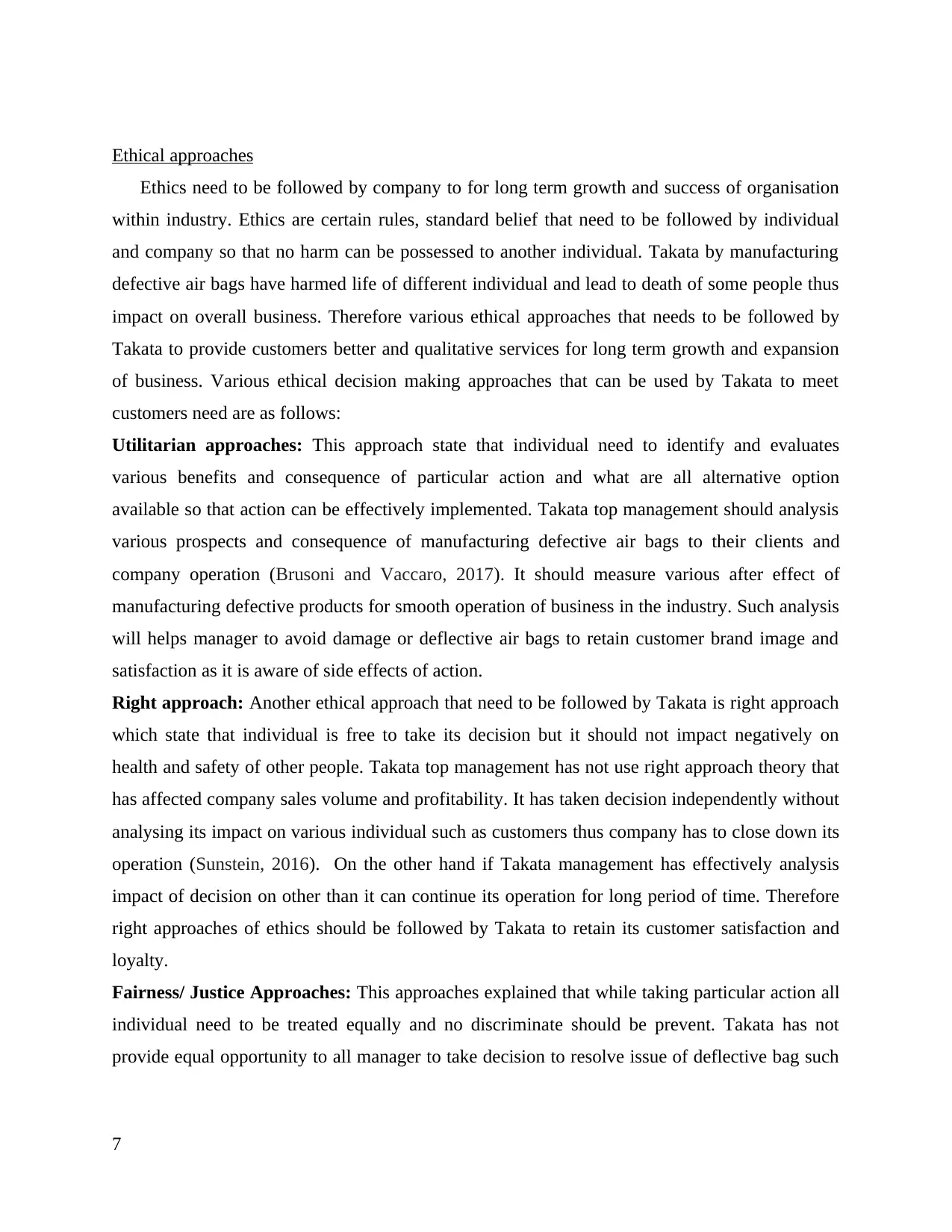
Ethical approaches
Ethics need to be followed by company to for long term growth and success of organisation
within industry. Ethics are certain rules, standard belief that need to be followed by individual
and company so that no harm can be possessed to another individual. Takata by manufacturing
defective air bags have harmed life of different individual and lead to death of some people thus
impact on overall business. Therefore various ethical approaches that needs to be followed by
Takata to provide customers better and qualitative services for long term growth and expansion
of business. Various ethical decision making approaches that can be used by Takata to meet
customers need are as follows:
Utilitarian approaches: This approach state that individual need to identify and evaluates
various benefits and consequence of particular action and what are all alternative option
available so that action can be effectively implemented. Takata top management should analysis
various prospects and consequence of manufacturing defective air bags to their clients and
company operation (Brusoni and Vaccaro, 2017). It should measure various after effect of
manufacturing defective products for smooth operation of business in the industry. Such analysis
will helps manager to avoid damage or deflective air bags to retain customer brand image and
satisfaction as it is aware of side effects of action.
Right approach: Another ethical approach that need to be followed by Takata is right approach
which state that individual is free to take its decision but it should not impact negatively on
health and safety of other people. Takata top management has not use right approach theory that
has affected company sales volume and profitability. It has taken decision independently without
analysing its impact on various individual such as customers thus company has to close down its
operation (Sunstein, 2016). On the other hand if Takata management has effectively analysis
impact of decision on other than it can continue its operation for long period of time. Therefore
right approaches of ethics should be followed by Takata to retain its customer satisfaction and
loyalty.
Fairness/ Justice Approaches: This approaches explained that while taking particular action all
individual need to be treated equally and no discriminate should be prevent. Takata has not
provide equal opportunity to all manager to take decision to resolve issue of deflective bag such
7
Ethics need to be followed by company to for long term growth and success of organisation
within industry. Ethics are certain rules, standard belief that need to be followed by individual
and company so that no harm can be possessed to another individual. Takata by manufacturing
defective air bags have harmed life of different individual and lead to death of some people thus
impact on overall business. Therefore various ethical approaches that needs to be followed by
Takata to provide customers better and qualitative services for long term growth and expansion
of business. Various ethical decision making approaches that can be used by Takata to meet
customers need are as follows:
Utilitarian approaches: This approach state that individual need to identify and evaluates
various benefits and consequence of particular action and what are all alternative option
available so that action can be effectively implemented. Takata top management should analysis
various prospects and consequence of manufacturing defective air bags to their clients and
company operation (Brusoni and Vaccaro, 2017). It should measure various after effect of
manufacturing defective products for smooth operation of business in the industry. Such analysis
will helps manager to avoid damage or deflective air bags to retain customer brand image and
satisfaction as it is aware of side effects of action.
Right approach: Another ethical approach that need to be followed by Takata is right approach
which state that individual is free to take its decision but it should not impact negatively on
health and safety of other people. Takata top management has not use right approach theory that
has affected company sales volume and profitability. It has taken decision independently without
analysing its impact on various individual such as customers thus company has to close down its
operation (Sunstein, 2016). On the other hand if Takata management has effectively analysis
impact of decision on other than it can continue its operation for long period of time. Therefore
right approaches of ethics should be followed by Takata to retain its customer satisfaction and
loyalty.
Fairness/ Justice Approaches: This approaches explained that while taking particular action all
individual need to be treated equally and no discriminate should be prevent. Takata has not
provide equal opportunity to all manager to take decision to resolve issue of deflective bag such
7
Paraphrase This Document
Need a fresh take? Get an instant paraphrase of this document with our AI Paraphraser
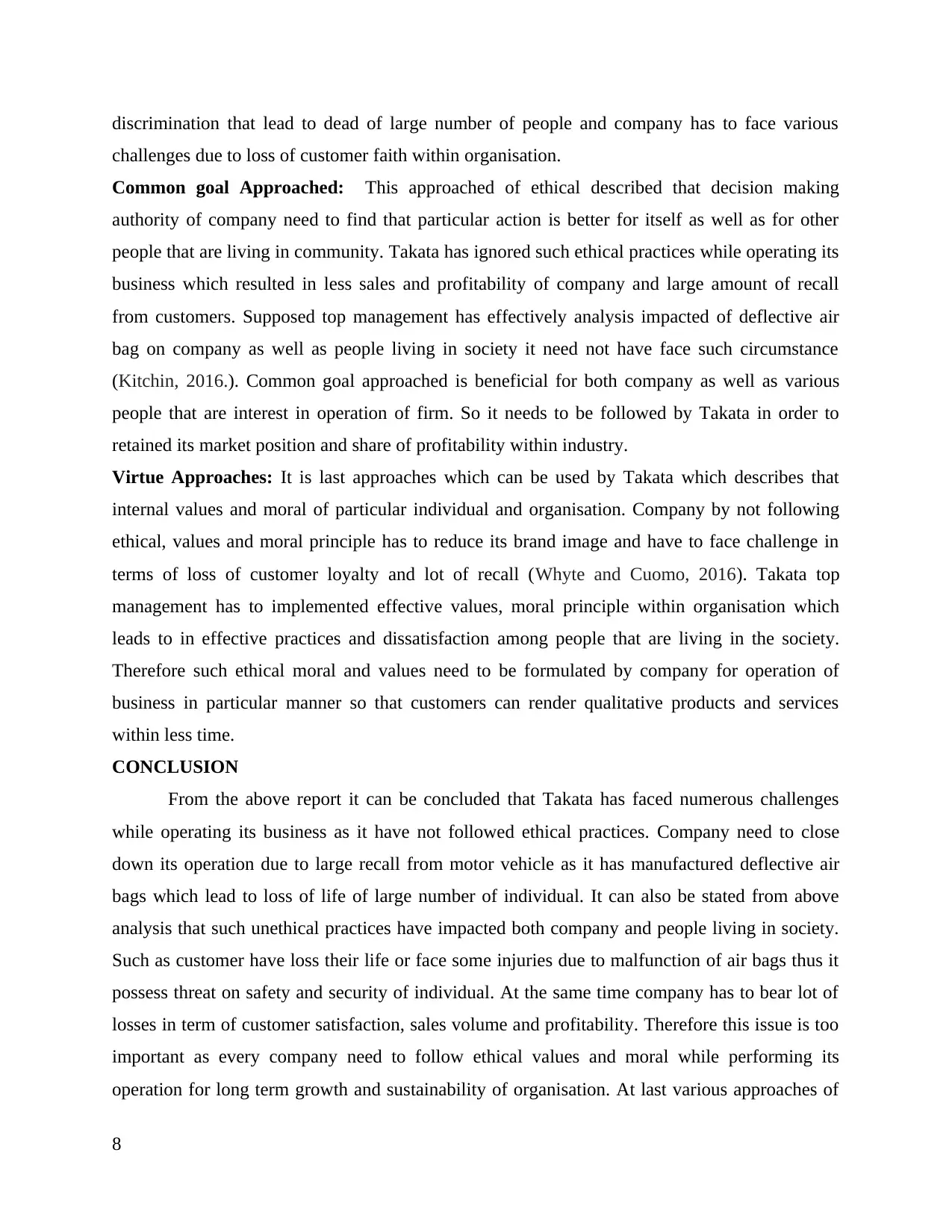
discrimination that lead to dead of large number of people and company has to face various
challenges due to loss of customer faith within organisation.
Common goal Approached: This approached of ethical described that decision making
authority of company need to find that particular action is better for itself as well as for other
people that are living in community. Takata has ignored such ethical practices while operating its
business which resulted in less sales and profitability of company and large amount of recall
from customers. Supposed top management has effectively analysis impacted of deflective air
bag on company as well as people living in society it need not have face such circumstance
(Kitchin, 2016.). Common goal approached is beneficial for both company as well as various
people that are interest in operation of firm. So it needs to be followed by Takata in order to
retained its market position and share of profitability within industry.
Virtue Approaches: It is last approaches which can be used by Takata which describes that
internal values and moral of particular individual and organisation. Company by not following
ethical, values and moral principle has to reduce its brand image and have to face challenge in
terms of loss of customer loyalty and lot of recall (Whyte and Cuomo, 2016). Takata top
management has to implemented effective values, moral principle within organisation which
leads to in effective practices and dissatisfaction among people that are living in the society.
Therefore such ethical moral and values need to be formulated by company for operation of
business in particular manner so that customers can render qualitative products and services
within less time.
CONCLUSION
From the above report it can be concluded that Takata has faced numerous challenges
while operating its business as it have not followed ethical practices. Company need to close
down its operation due to large recall from motor vehicle as it has manufactured deflective air
bags which lead to loss of life of large number of individual. It can also be stated from above
analysis that such unethical practices have impacted both company and people living in society.
Such as customer have loss their life or face some injuries due to malfunction of air bags thus it
possess threat on safety and security of individual. At the same time company has to bear lot of
losses in term of customer satisfaction, sales volume and profitability. Therefore this issue is too
important as every company need to follow ethical values and moral while performing its
operation for long term growth and sustainability of organisation. At last various approaches of
8
challenges due to loss of customer faith within organisation.
Common goal Approached: This approached of ethical described that decision making
authority of company need to find that particular action is better for itself as well as for other
people that are living in community. Takata has ignored such ethical practices while operating its
business which resulted in less sales and profitability of company and large amount of recall
from customers. Supposed top management has effectively analysis impacted of deflective air
bag on company as well as people living in society it need not have face such circumstance
(Kitchin, 2016.). Common goal approached is beneficial for both company as well as various
people that are interest in operation of firm. So it needs to be followed by Takata in order to
retained its market position and share of profitability within industry.
Virtue Approaches: It is last approaches which can be used by Takata which describes that
internal values and moral of particular individual and organisation. Company by not following
ethical, values and moral principle has to reduce its brand image and have to face challenge in
terms of loss of customer loyalty and lot of recall (Whyte and Cuomo, 2016). Takata top
management has to implemented effective values, moral principle within organisation which
leads to in effective practices and dissatisfaction among people that are living in the society.
Therefore such ethical moral and values need to be formulated by company for operation of
business in particular manner so that customers can render qualitative products and services
within less time.
CONCLUSION
From the above report it can be concluded that Takata has faced numerous challenges
while operating its business as it have not followed ethical practices. Company need to close
down its operation due to large recall from motor vehicle as it has manufactured deflective air
bags which lead to loss of life of large number of individual. It can also be stated from above
analysis that such unethical practices have impacted both company and people living in society.
Such as customer have loss their life or face some injuries due to malfunction of air bags thus it
possess threat on safety and security of individual. At the same time company has to bear lot of
losses in term of customer satisfaction, sales volume and profitability. Therefore this issue is too
important as every company need to follow ethical values and moral while performing its
operation for long term growth and sustainability of organisation. At last various approaches of
8
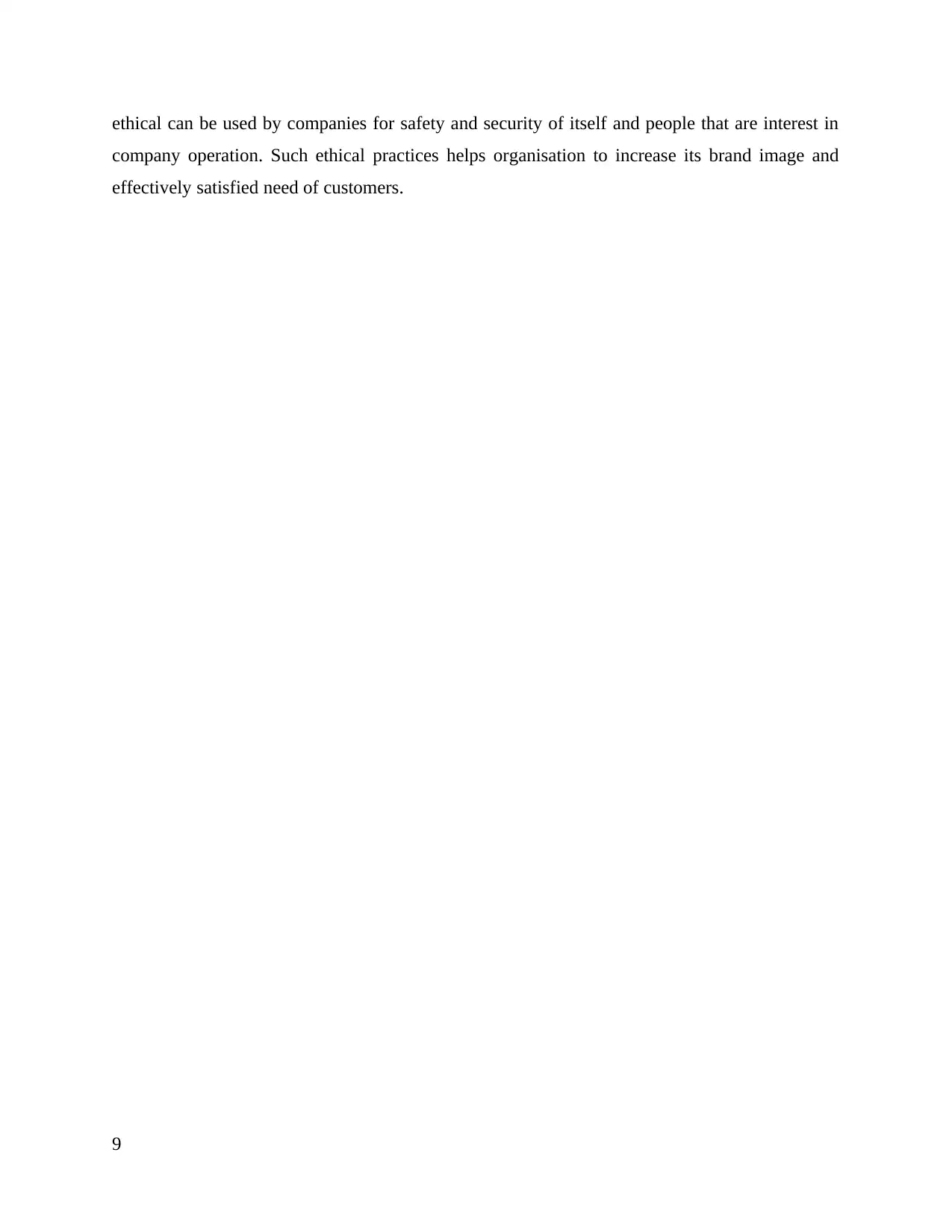
ethical can be used by companies for safety and security of itself and people that are interest in
company operation. Such ethical practices helps organisation to increase its brand image and
effectively satisfied need of customers.
9
company operation. Such ethical practices helps organisation to increase its brand image and
effectively satisfied need of customers.
9
⊘ This is a preview!⊘
Do you want full access?
Subscribe today to unlock all pages.

Trusted by 1+ million students worldwide
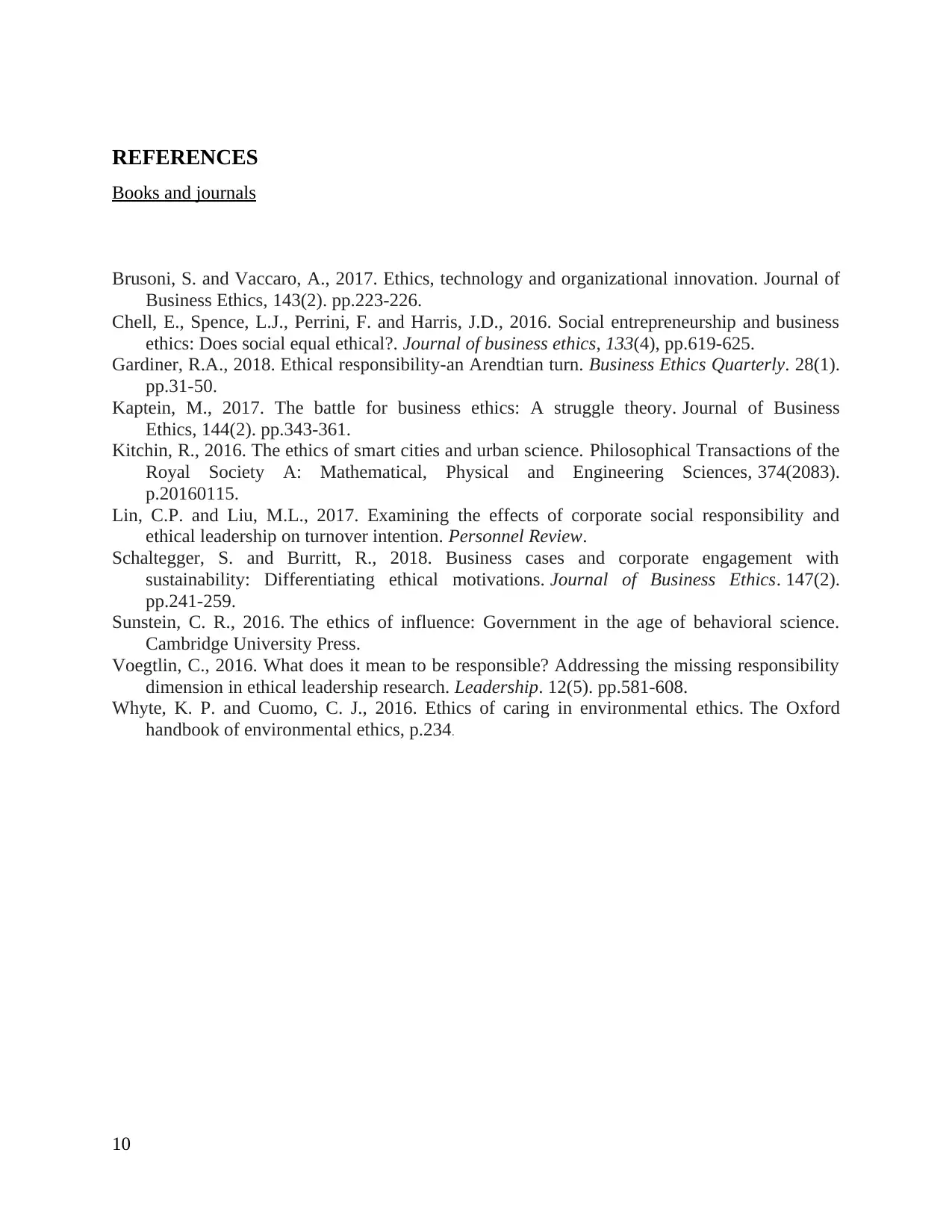
REFERENCES
Books and journals
Brusoni, S. and Vaccaro, A., 2017. Ethics, technology and organizational innovation. Journal of
Business Ethics, 143(2). pp.223-226.
Chell, E., Spence, L.J., Perrini, F. and Harris, J.D., 2016. Social entrepreneurship and business
ethics: Does social equal ethical?. Journal of business ethics, 133(4), pp.619-625.
Gardiner, R.A., 2018. Ethical responsibility-an Arendtian turn. Business Ethics Quarterly. 28(1).
pp.31-50.
Kaptein, M., 2017. The battle for business ethics: A struggle theory. Journal of Business
Ethics, 144(2). pp.343-361.
Kitchin, R., 2016. The ethics of smart cities and urban science. Philosophical Transactions of the
Royal Society A: Mathematical, Physical and Engineering Sciences, 374(2083).
p.20160115.
Lin, C.P. and Liu, M.L., 2017. Examining the effects of corporate social responsibility and
ethical leadership on turnover intention. Personnel Review.
Schaltegger, S. and Burritt, R., 2018. Business cases and corporate engagement with
sustainability: Differentiating ethical motivations. Journal of Business Ethics. 147(2).
pp.241-259.
Sunstein, C. R., 2016. The ethics of influence: Government in the age of behavioral science.
Cambridge University Press.
Voegtlin, C., 2016. What does it mean to be responsible? Addressing the missing responsibility
dimension in ethical leadership research. Leadership. 12(5). pp.581-608.
Whyte, K. P. and Cuomo, C. J., 2016. Ethics of caring in environmental ethics. The Oxford
handbook of environmental ethics, p.234.
10
Books and journals
Brusoni, S. and Vaccaro, A., 2017. Ethics, technology and organizational innovation. Journal of
Business Ethics, 143(2). pp.223-226.
Chell, E., Spence, L.J., Perrini, F. and Harris, J.D., 2016. Social entrepreneurship and business
ethics: Does social equal ethical?. Journal of business ethics, 133(4), pp.619-625.
Gardiner, R.A., 2018. Ethical responsibility-an Arendtian turn. Business Ethics Quarterly. 28(1).
pp.31-50.
Kaptein, M., 2017. The battle for business ethics: A struggle theory. Journal of Business
Ethics, 144(2). pp.343-361.
Kitchin, R., 2016. The ethics of smart cities and urban science. Philosophical Transactions of the
Royal Society A: Mathematical, Physical and Engineering Sciences, 374(2083).
p.20160115.
Lin, C.P. and Liu, M.L., 2017. Examining the effects of corporate social responsibility and
ethical leadership on turnover intention. Personnel Review.
Schaltegger, S. and Burritt, R., 2018. Business cases and corporate engagement with
sustainability: Differentiating ethical motivations. Journal of Business Ethics. 147(2).
pp.241-259.
Sunstein, C. R., 2016. The ethics of influence: Government in the age of behavioral science.
Cambridge University Press.
Voegtlin, C., 2016. What does it mean to be responsible? Addressing the missing responsibility
dimension in ethical leadership research. Leadership. 12(5). pp.581-608.
Whyte, K. P. and Cuomo, C. J., 2016. Ethics of caring in environmental ethics. The Oxford
handbook of environmental ethics, p.234.
10
1 out of 10
Related Documents
Your All-in-One AI-Powered Toolkit for Academic Success.
+13062052269
info@desklib.com
Available 24*7 on WhatsApp / Email
![[object Object]](/_next/static/media/star-bottom.7253800d.svg)
Unlock your academic potential
Copyright © 2020–2026 A2Z Services. All Rights Reserved. Developed and managed by ZUCOL.





